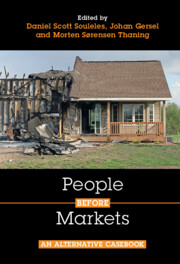Book contents
- People Before Markets
- People Before Markets
- Copyright page
- Dedication
- Contents
- Contents by Topic
- Authors
- 1 Introduction: Why Are You Here?
- 2 Some Philosophical Help with “Neoliberalism”
- Part I Our World
- 3 Where Should Food Come From?
- 4 Where Should Water Come From?
- 5 Who Gets to Own Land?
- 6 How Should Food be Produced?
- 7 Who Decides Where They Live?
- 8 How Much Land Do We Need?
- 9 Where Should We Park?
- 10 How Should We Deal with Climate Change?
- 11 How Should We Make an Impact?
- Part II Our Lives
- Part III Our Work
- Index
- References
7 - Who Decides Where They Live?
from Part I - Our World
Published online by Cambridge University Press: 27 October 2022
- People Before Markets
- People Before Markets
- Copyright page
- Dedication
- Contents
- Contents by Topic
- Authors
- 1 Introduction: Why Are You Here?
- 2 Some Philosophical Help with “Neoliberalism”
- Part I Our World
- 3 Where Should Food Come From?
- 4 Where Should Water Come From?
- 5 Who Gets to Own Land?
- 6 How Should Food be Produced?
- 7 Who Decides Where They Live?
- 8 How Much Land Do We Need?
- 9 Where Should We Park?
- 10 How Should We Deal with Climate Change?
- 11 How Should We Make an Impact?
- Part II Our Lives
- Part III Our Work
- Index
- References
Summary
One characteristic of the United States has been overlapping waves of dispossession, settlement, and dispossession again. These waves of dispossession and settlement often come with big changes in economic and political systems, and with no small amount of violence. Here, Oliver writes about historically black communities who, in the wake of slavery, established townships on Indian land in what is now the state of Oklahoma. In Oklahoma, too, “Indian Land” was in part established when white settlers forced Indians out of other parts what is now the United States and into Oklahoma. A more recent wave of dispossession has come about due to the oil-fracking boom that has swept the great plains of the United States. With this boom has come oil speculation and speculators seeking to move black communities out of their homes and off their land. Often this sort of dispossession comes in the language of the home as an investment, and the home owner as an investor seeking to make profit. This logic of marketization challenges the idea of the houseowner as a cornerstone of the community and instead implies a self-understanding as a Homo economicus seeking to maximize personal utility. Oliver shows how the communities weigh these arguments as people decide what sort of community they want to live in and what money, if any, they should make from their homes.
- Type
- Chapter
- Information
- People before MarketsAn Alternative Casebook, pp. 140 - 156Publisher: Cambridge University PressPrint publication year: 2022

